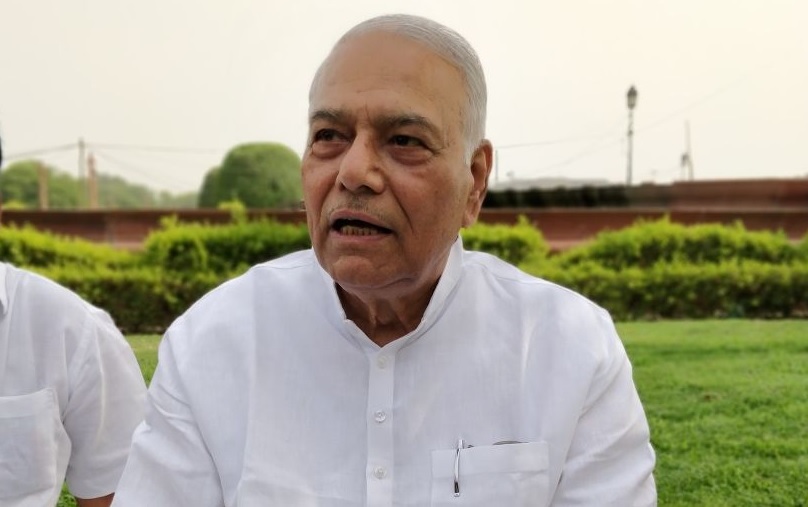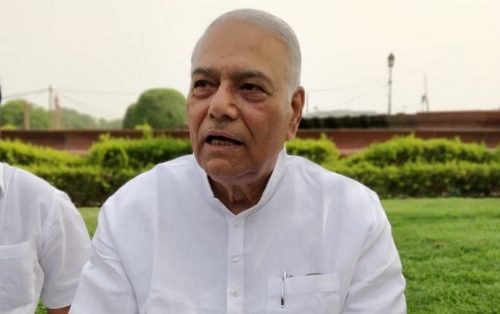
Concerned Citizens Group, led by former External Affairs minister Yashwant Sinha, urges New Delhi to restore Jammu and Kashmir’s constitutional position.
Concerned Citizens Group, an activist group led by former External Affairs minister Yashwant Sinha, has demanded the immediate release of “all Kashmiris who were taken into preventive detention under Public Safety Act (PSA),” including former Jammu and Kashmir Chief Minister Mehbooba Mufti.
In a letter, dated August 1, 2029, the group asked the government to “restore 4-G communication” and start “a multi-level dialogue process with all those affected by the August 5 decision.”
The government of Prime Minister Narendra Modi ended the special status enjoyed by the state of Jammu and Kashmir on August 5, 2019, and bifurcated it into two “union territories.”
Mufti and hundreds of other leaders were detained immediately after the move and kept under what New Delhi calls “preventive detention.”
Other signatories of the Concerned Citizens Group letter include Wajahat Habibullah, former Chairman of Minorities Commission; Air Vice-Marshall (Retd) Kapil Kak; journalist Bharat Bhushan and social and peace activist Sushobha Barve.
Sinha, who served as External Affairs Minister under Prime Minister Atal Behari Vajpaee from 2002 to 2004, has been one of the most vocal critics of Modi. Sinha also served as Minister of Finance from 1998 to 2002, and, prior to that, under Prime Minister Chandra Shekhar during 1990-1991.
The letter also demanded that Kashmiri farmers and businessmen be compensated “for their economic losses which were the direct result of unilateral action by the government.” It also urged the government to not “push through laws in the absence of a legislature,” restore “land rights of the local inhabitants to prevent demographic change,” and stop “the intimidation of media personnel.”
Here is the full letter:
Statement by Concerned Citizens Group
1 August 2020
It has been a year since August 5 2019, when the Central government passed the J&K Reorganization Act abrogating Article 370, 35-A and dividing the state into two Union Territories. In early hours of that day, a complete lockdown was imposed and mainstream political leaders, businessmen, lawyers and thousands of others were arrested.
J&K continues to be in a social, economic, political and communication lockdown. None of the stated goals of the government – of bringing Kashmir closer to India, ending militancy, bringing development to the state – have been achieved. Instead the Kashmiris have lost any faith they had in the Indian political leadership and the judiciary. The Supreme Court has still not found time to take up the petitions challenging the legal and constitutional validity of the J&K Reorganization Act. While many political, business leaders and lawyers have been released in the recent past, many continue to be in detention, the most prominent among them being former Chief Minister Mehbooba Mufti.
The Centre’s action internationalized the Kashmir issue to the detriment of India and the government was criticized for human rights violations and stoking Islamophobia. Security experts point out that the changes in the status of J&K also prompted Chinese incursions in Ladakh.
The Concerned Citizens Group (CCG) visited Kashmir twice since August 5 2019. During our visits in September and November 2019, we met a cross section of people – journalists, civil rights activists, a Kashmiri Member of Parliament, Members of Kashmir Chamber of Commerce, lawyers, farmers and Horticulturalists, Sarpanchs and Panchs. We found that the Centre’s actions had led to shock, trauma and humiliation amongst the local citizens. Their simmering anger at their helplessness still persists. However, it is significant that the Kashmiris through their display of mature behavior prevented public violence and chose mass civil disobedience instead to show unhappiness.
The Kashmiris seem to believe that the Indian government wants to marginalize them. This fear is expressed most vividly in the fear of demographic change by creating new settlements for outsiders. That the Union government has used the pandemic-induced lockdown to implement domicile laws for the UT has not helped allay these fears. The media which could have promoted debate on this issue is being harassed and hounded.
The internet ban in J&K which began on August 5 continues with only 2G connectivity being provided now. This has affected students, job seekers, entrepreneurs, businesses and ordinary citizens alike and created havoc in banking, trade, business and healthcare. There are estimated to be 14 lakh children who were learning from online services. The 2G technology cannot sustain online learning, which is a ready option being used in the rest of the country. The school students in the rural areas who do not have either laptops or smart mobile phones are losing out a great deal.
Kashmir’s economy was also plunged into an abyss with the sudden and mass exodus in early August of tourists and the non-Kashmiri labour force. The tourism sector is in tatters. Its nascent IT sector has shut it down. The handicrafts sector is in dire straits as it could not book export orders for Christmas and New Year sales. The process of harvesting and marketing of fruits to the wholesale markets last year was impacted by militant threats, unavailability of outside labor and the killing of truck drivers and their assistants as well as non-Kashmiri orchard labor. Additionally, a freak snow storm last year uprooted thousands of apple trees, making the horticultural losses even more severe.
Militancy has not gone down. Many disaffected youth continue to join its ranks despite security forces having killed 136 militants this year. There are also reports of increased infiltration from across the border. The violence on the LoC has also increased exponentially. The situation is unlikely to take a positive turn in the months ahead. As of now, neither the Kashmiris nor the Central government seem to have a clear road map ahead.
Recommendations:
In view of the above findings, the Concerned Citizens Group would like to make the following recommendations to the Central government:
- Release forthwith Mehbooba Mufti and all Kashmiris who were taken into preventive detention under Public Safety Act (PSA).
- Restore 4-G communication in J&K.
- Lift the curbs on all peaceful political activity.
- Start a multi-level dialogue process with all those affected by the August 5 decision.
- Compensate Kashmiri farmers and businessmen for their economic losses which were the direct result of unilateral action by the government. Extend the same bank loan deferment and facilities to J&K businesses as in the rest of the country.
- Do not push through laws in the absence of a legislature.
- Restore land rights of the local inhabitants to prevent demographic change.
- Stop the intimidation of media personnel.
- Restore constitutional position of J&K as it was when an election government was in power in June 2018.
Signatories:
Yashwant Sinha, former Foreign Minister of India
Wajahat Habibullah, former Chairman of Minorities Commission
Air Vice-Marshall (Retd) Kapil Kak
Bharat Bhushan, Journalist
Sushobha Barve, Social and Peace Activist
ALSO READ:
Ahead of Trump visit four US Senators question India’s Kashmir policy (February 14, 2020)



